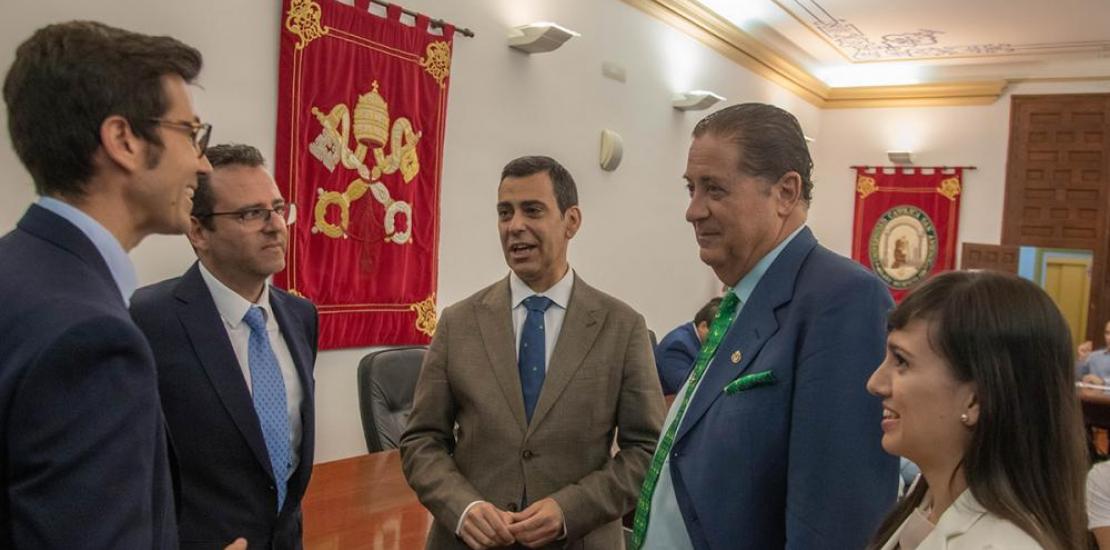The Region of Murcia ranks poorly in the use of public transport
This morning, UCAM held the VIII Mobility and Road Safety Conference where it was highlighted that, in the Region of Murcia, an individual uses public transport 36 times per year, while this number is 240 in Madrid, 190 in Barcelona, 102 in Valencia or 70 in Alicante.
Promoting an ecological transition in every aspect of life, also through planning models and policies to foster road safety and sustainable mobility, was the theme of the VIII Mobility and Road Safety Conference, organised by the UCAM Bachelor's Degree in Civil Engineering and held this morning at the Campus of Los Jerónimos. Pedro de los Santos Jiménez, Vice-Dean of the Degree, and José Ramón Díez de Revenga, Regional Minister of Promotion and Infrastructures of the CARM, spoke at the opening.
Only 4% of urban commutes are by public transport. That is, 36 commutes per citizen and year, as opposed to Madrid, with 240; Barcelona, with 190; Valencia, with 102, or Alicante, with 70. Therefore, ‘we must study what the problem with public transport is’, said Pedro de los Santos Jiménez, who also stated that ‘A lot has been done in the Region of Murcia: there is a Master Plan for Passenger Transport, the Movibus scheme – which we highly appreciate, especially as a university, since it will provide 17 municipalities of the Region with a direct bus to the universities – so we would need to examine where the problem really lies’. In this respect, he recalled a study conducted in 2008/2009, with a sample of 4000 people, on public transport in the Region of Murcia, ‘with very relevant figures that almost resemble what we can find nowadays. Users were asked why they used public transport: because they had no licence, because they had no vehicle, because of parking difficulties, because it was cheaper, because it was faster. Only 32 selected the last option – only 0.8%’.
On his part, the counsellor for Development, who has thanked UCAM for celebrating these Events, has recalled the actions that are being taken by the Region of Murcia to develop more sustainable mobility, and the crucial role of universities: ‘The youth represents more than 70% of public transport users, and one of the most important reasons for this is their commute to universities’.
The keynote speech which opened the event was given by Alberto Menchón, Deputy Chief of the Regional Traffic Department of the Region of Murcia, who also highlighted that there is a general consensus that we are experiencing a disruptive transformation in mobility. Therefore, ‘public administrations must take action in order to offer citizens a much more sustainable mobility, high-quality public transport and mobility schemes that fit the needs of society.
During the Conference, a debate was held on mobility proposals and policies in Murcia and its metropolitan area, in which political representatives of the Murcian municipality participated: Rebeca Pérez (PP), Carmen Fructuoso (PSOE), Juan Fernando Hernández (CIUDADANOS), and José Mariano Orenes (VOX). All of them have emphasised the need to take action both in the town centre and in the metropolitan area, but with disagreements on what to do and the difficulties amongst public administrations, although they did agree that everybody ought to be involved.
A study to improve mobility in Murcia
The UCAM Chair of Mobility and Sustainable Transport in the Metropolitan Area of Murcia, in cooperation with the public transport concessionaires of Tranvía de Murcia and Transportes Murcia, started an ‘Online Survey on Mobility in the Metropolitan Area of Murcia’ at the end of last year. Roberto Liñán, Director of the Chair, participated in this Conference, where he pointed out some of the first conclusions obtained from this first stage of the study, where the figures show a change in people’s minds before COVID and now ‘in favour of a sustainable mobility for public transport’. Roberto has emphasised users’ eagerness regarding an improvement and expansion of the tram line and the reorganisation of public transport systems, highlighting a shared digitalisation: ‘trams, city and intercity buses, bicycles and scooters shall belong to a single payment platform’.




